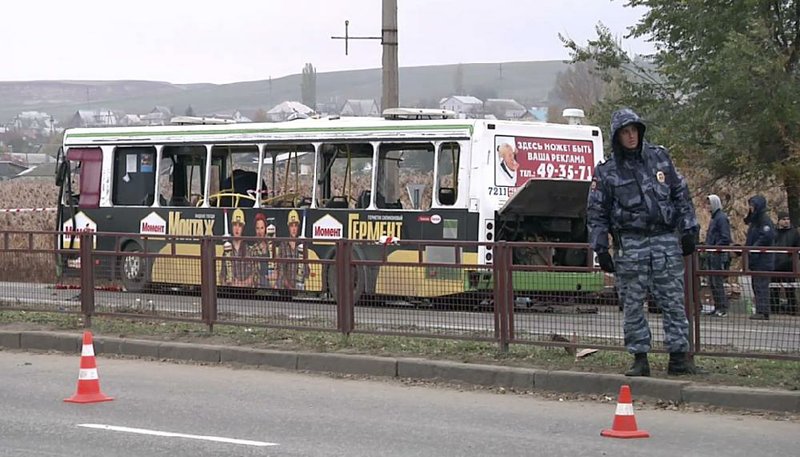VOLGOGRAD, Russia - Russian security forces hunted Tuesday for the husband of a bomber who blew herself up on a bus in southern Russia, killing six people and wounding more than 30. They also raised the possibility that Moscow, not Volgograd, was the bomber’s original target.
Adding to the mystery surrounding Monday’s explosion, Russian state television released pictures of the attacker’s passport that looked different, even though they carried the same number.
Investigators said 30-yearold Naida Asiyalova, a native of the volatile province of Dagestan in Russia’s North Caucasus region, was married to an ethnic Russian man who had joined Islamic militants.They said her husband, Dmitry Sokolov, has become a top rebel expert in explosives and could have been involved in equipping his wife for the suicide mission.
Sokolov has been on the run since he left his home in a Moscow suburb in the summer of 2012, according to the investigators.
Soon after the attack, Russian state-controlled TV stations showed pictures of Asiyalova’s passport which contained a black-and-white photograph of her wearing an Islamic headscarf in violation of Russian regulations. Some observers noted that photo would have led to her detention if police had stopped her for an identity check. The shown passport looked entirely intact, which seemed unusual after the deadly suicide explosion.
On Tuesday, state television stations released a new picture of her passport that had a different color photograph without a headscarf and looked damaged. The passports shown Monday and Tuesday had identical numbers, and bloggers and online media quickly went abuzz with conspiracy theories.
The Investigative Committee, Russia’s main investigative agency conducting the probe, said it hadn’t released the first picture, only the second one shown Tuesday.
NTV, one of the three state-controlled nationwide TV stations, said Monday’s picture was a scan of Asiyalova’s passport taken from her personal dossier at Russian security agencies that had been monitoring her for her suspected terror links. It said a photo of Asiyalova in a headscarf had been put atop the scan by a security agent.
The bombing in the southern Volgograd region was the first attack in years against a civilian target outside the North Caucasus region, where an Islamic insurgency has been simmering for more than a decade after two separatist wars in Chechnya. Volgograd lies 400 miles northeast of the North Caucasus.
In Dagestan, the center of the insurgency, bombings and shootings occur almost daily. Dzhokhar and Tamerlan Tsarnaev, the brothers accused of carrying out the Boston Marathon bombings, have roots in Dagestan and Chechnya.
It was not clear why Asiyalova chose Volgograd, since she had a ticket for Moscow, authorities said.
Vladimir Markin, the spokesman for the Investigative Committee, said authorities are trying to determine whether Asiyalova had planned her attack in Volgograd or made an impromptu choice along the way. He said Asiyalova took a Moscow-bound bus from Dagestan, but left it in Volgograd and took a local bus, where she detonated her explosives Monday.
The bomb was rigged with shrapnel, which caused severe injuries and left many of the wounded in grave condition. Most of the passengers were students going home after lessons.
Dmitry Yudin, a student who suffered a concussion and arm wound, said he had noticed Asiyalova when she boarded the bus because she wore a dark Islamic headscarf. He said the suspected attacker looked “calm and collected” and kept a low profile.
Rasul Temirbekov, a spokesman for the Investigative Committee’s regional branch in Dagestan, said Asiyalova met Sokolov, a university student, in Moscow and recruited him to join the rebels in Dagestan. He studied Islam and Arabic, took the pseudonym of Abdul Jabbar and quickly gained a reputation with the militants.
Investigators believe that Sokolov prepared explosives for a suicide bomber who blew herself up outside the regional branch of Russia’s Interior Ministry in Dagestan in May, killing 12 people.
Temirbekov said Asiyalova had a fatal bone illness, but her mother disputed that, telling the daily Izvestia newspaper that her daughter had stomach problems after taking diet pills but nothing serious.
Ravzat Asiyalova also said her daughter became strongly religious three years ago. She told Izvestia she disapproved of that, and her daughter rarely called her, mainly to avoid arguments.
In possible retaliation for Monday’s bombing, unidentified attackers threw firebombs late Monday at a Muslim prayer house in Volgograd, police said. A custodian put out the fire.
Information for this article was contributed by Arsen Mollayev of The Associated Press.
Front Section, Pages 2 on 10/23/2013
